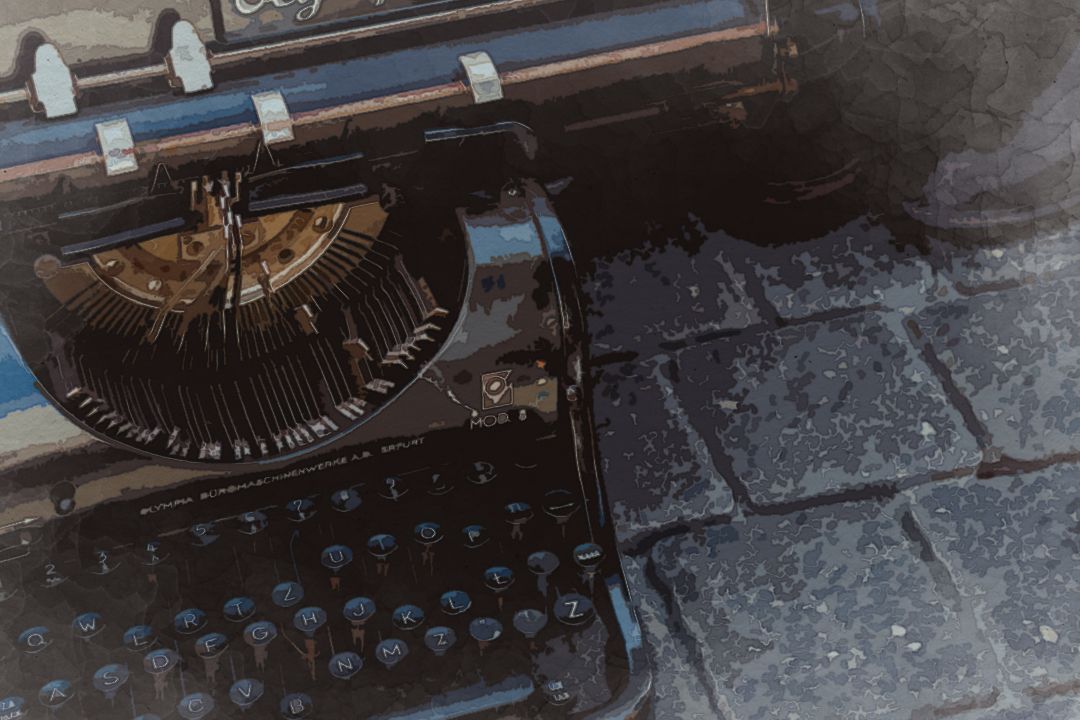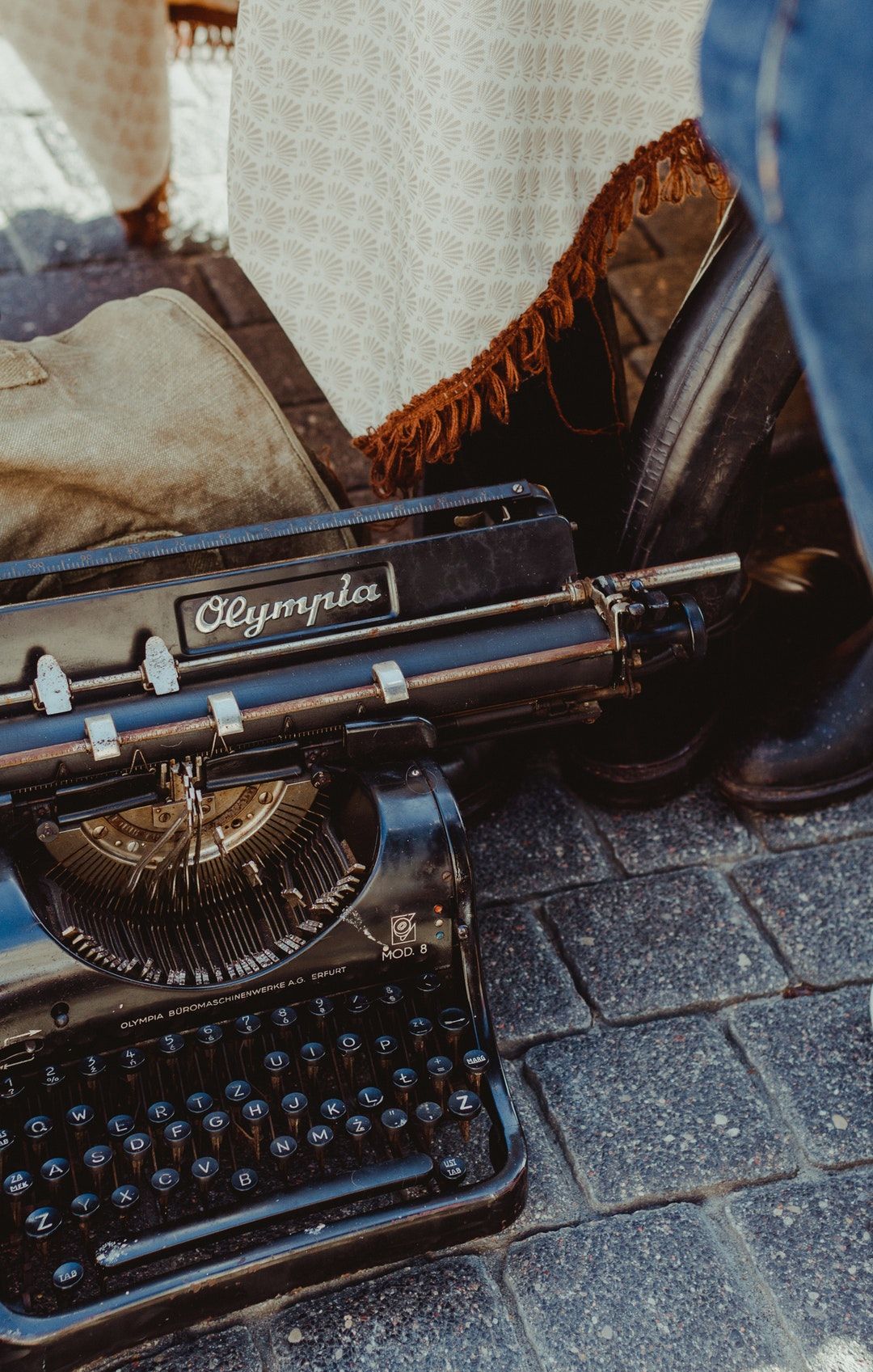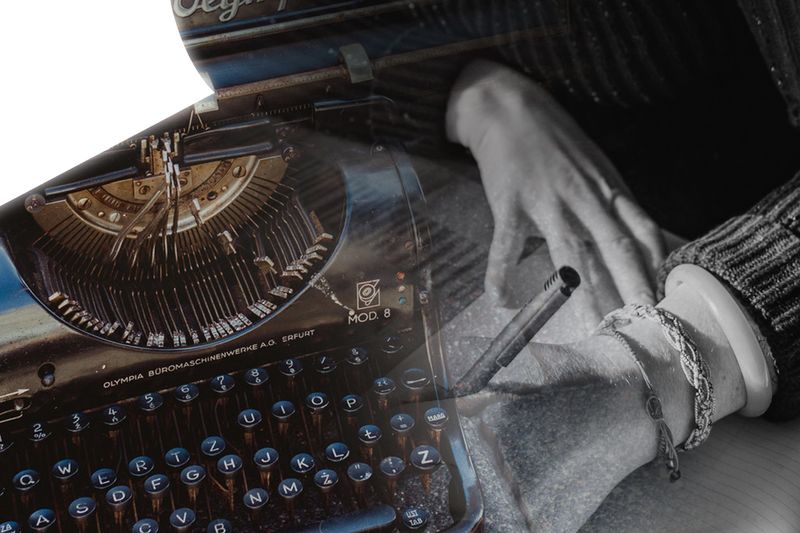Why Banish the Poets Then?

Bitter Sweet Symposium Without the Poets
In a small attic room, a writer faced a worn desk under the flicker of a dim bulb. On the desk rested an old typewriter with keys marked by stories, a yellowed paper scrawled with handwritten notes and a quietly humming electronic tablet. The writer grappled with the choice between tradition and innovation.
Memories pass through the writer's mind like fleeting fragments of a dream. The room seemed to hold echoes of the past with creaky floorboards and the rustle of paper, creating a sense of nostalgia. It was a gathering of musings without the vibrancy of poets, a bittersweet symposium.
The typewriter, a relic of literary battles, stood prominently on the desk. Its keys bore the wear of countless tales, a testament to a bygone era. Next to it, a yellowed paper, filled with handwritten notes in faded blue ink, revealed the personal touch of an earlier time. A sleek electronic tablet in the corner emitted a soft glow, offering a path to the future.
As the writer contemplated the tools before them, the room seemed to carry a history. Creaking floorboards whispered of creative solitude, and ink-stained sketches on the walls spoke of the evolution of the craft. The atmosphere conveyed a quiet intensity as the writer grappled with their contribution to the bittersweet symposium without poets.
Outside the attic window, the moon glowed gently on neighbouring rooftops. The night held a stillness, emphasizing the urgency of the writer's decision. The clock's ticking underscored the passage of time, setting the stage for the writer's contemplation.
The writer faced the battle between tradition and innovation in this space where the physical and digital converged. The room witnessed the struggle and stood as a silent arbiter in the bittersweet symposium without poets. As the writer's fingers hovered above the keys, the symphony of creation awaited its next movement, charged with the potential for a new narrative.
Heard melodies are sweet, but those unheard are sweeter.
— John Keats (1795-1821)
The writer sat in the attic, torn between a typewriter, a handwritten note, and an electronic tablet. The old relic typewriter hinted at the stories of famous authors who used it. The handwritten note spoke of a personal touch and the joy of creating with a pen. The tablet promised a future where writing blended seamlessly with technology.
Background music played softly, providing a backdrop to the writer's contemplation. The room had a mix of old and new, with the writer grappling with the choices before them. The typewriter's keys echoed history, the handwritten note had a human connection, and the tablet represented a modern approach to writing.
The room was quiet, illuminated by a flickering bulb. The writer felt the weight of tradition and the pull of innovation. Outside, the night was serene, as if nature observed the writer's internal struggle.
At this moment, the writer faced a decision. The music, the tools on the desk, and the atmosphere in the room created a scene of creative crossroads. With fingers poised, the writer had to choose a path to shape their artistic journey.
Music is a moral law. It gives soul to the universe, wings to the mind, flight to the imagination, and charm and gaiety to life and everything.
— Plato (c. 424 BC to c. 348 BC)
The writer caught in an internal debate, sat in the attic as background music played softly. Remembering the quote, "Music is a moral law," the melody provided a poignant backdrop to the ongoing struggle.
The typewriter's clatter, the scratch of the pen on a handwritten note, and the electronic tablet's hum merged with the music's harmonious notes. Together, they created a mix of sounds that represented various creative potentials.
The room, dimly lit by a flickering bulb, echoed with the mechanical noise of the typewriter and the tactile scratch of the pen. The electronic tablet's hum added a modern touch to the scene. Each tool contributed to the evolving narrative, blending tradition, personal connection, and technological innovation.
Outside the attic window, the night was quiet. The writer, surrounded by tools of expression, felt the weight of the decision. With fingers poised over the typewriter keys, the pen, and the tablet's touchscreen, the writer hesitated—a solitary figure facing the choice between tradition and innovation. The music, as a constant companion, underscored the gravity of the decision.
Poetry must have something in it that is barbaric, vast and wild.
— Denis Diderot (1713-1784)
In the quiet attic, it was clear that real creativity came from the raw and unbridled parts of the soul, meeting the disciplined and refined. The tools on the desk – the typewriter, the handwritten note, and the electronic tablet – weren't just tools. They were ways to express the untamed spirit within.
As the writer sorted through memories and choices, the concept of being a writer faded away. The concrete tools on the desk took over – the typewriter, the handwritten note, and the electronic tablet. They represented practical means of production, marking the passage of time and the push of progress.
The creaking floorboards and the rustle of paper in the attic seemed to carry the echoes of past writers. Standing at this creative crossroads, the writer felt a connection to those who came before, realizing the weight of contributing to an ongoing narrative.
Outside the window, the moon's glow illuminated the world. The flickering bulb, the typewriter's keys, the handwritten note, and the electronic tablet were silent witnesses to the writer's inner conflict, frozen in a moment suspended between tradition and change.
In this evolving scene, the focus shifted from the writer's identity to the practical tools. The room, filled with evidence of creative evolution, held an air of anticipation. With each keystroke, pen scratch, and tablet interaction, the writer moved toward a decision – an acknowledgment that creativity now unfolded at the intersection of tradition and progress.
Everything begins in mysticism and ends in politics.
— Charles Péguy (1873-1914)
The distant voice echoed in the space, a reminder of the inevitable shift from creative mystique to societal pragmatism.
Amid the ongoing symphony of typewriter keys, pen scratches, and electronic hum, the writer grappled with the practical tools on the desk. The creaking floorboards seemed to mark the evolution from the abstract realms of creativity to the pragmatic considerations of societal constructs.
In the face of this evolution, the writer clung to the rebellious nature of creation. Whether through the clatter of the typewriter, the strokes of the pen, or the digital interface of the tablet, the act of writing remained a rebellion against societal expectations. It was a commitment to the untamed spirit within, a refusal to conform to pragmatic norms.
The moon's glow continued outside the attic window, indifferent to the writer's internal conflict. The flickering bulb, typewriter keys, handwritten notes, and electronic tablet stood as silent witnesses to the clash between the artist's rebellious instinct and societal pragmatism.
In this decisive moment, the writer's fingers hovered above the tools, carrying the weight of creative responsibility. Now a battleground of tradition, innovation, and societal pragmatism, the room held its breath as the writer hesitated on the edge of a decision. Each keystroke, pen scratch, and interaction with the tablet became a declaration of defiance against the inevitable transformation—a testament to the enduring spirit of creation in the face of encroaching pragmatism.
Poetry, even when apparently most fantastic, is always a revolt against artifice, a revolt, in a sense, against actuality.
— James Joyce (1882-1941)
In the quiet attic, the rhythmic click of keys on the typewriter and the deliberate pen stroke marked the act of creation. It was a rebellion against artificial constraints, a pushback against the stifling norms of convention. The room seemed to absorb each sound, becoming a living testament to the unyielding spirit of creation that echoed in the solitude.
Amidst this creative process, a cautionary note lingered like a subtle undercurrent. It served as a reminder against expecting too much. It was a pragmatic whisper, cautioning the writer to be wary of harbouring overly sentimental views of life. The words hung there, a subtle restraint on the ambitious dreams that could lead to a softness ending in bitterness.
The typewriter, the handwritten note, and the electronic tablet became vessels for this nuanced interplay between rebellion and caution. The attic, bathed in the quiet glow of a flickering bulb, witnessed the delicate dance of creativity and realism.
Outside the attic window, the moon cast a gentle light on the surroundings. The night was serene, seemingly indifferent to the internal conflict of the writer. With its typewriter keys clicking, pen scratching on paper, and the occasional hum of the electronic tablet, the room held an air of introspection.
In this charged atmosphere, the writer's contemplation deepened. The tools on the desk became conduits for the expression of an untamed spirit, yet each stroke carried the weight of a cautionary reminder. Fingers poised above the tools, the writer navigated the creative journey, mindful of the balance between ambition and grounded expectations. Each sound in the attic, from the click of keys to the soft rustle of paper, contributed to the evolving narrative, a quiet rebellion against artificial constraints tempered by the caution against expecting too much.
To expect too much is to have a sentimental view of life, and this is a softness that ends in bitterness.
— Flannery O'Connor (1925-1964)
The typewriter, handwritten note, and electronic tablet now carried the weight of this caution. Each keystroke and pen scratch held a deeper significance, aware of the delicate balance between aspiration and acceptance.
Outside the window, the moon's glow remained unaffected. With its flickering bulb, typewriter keys, handwritten notes, and electronic tablet, the room stood as silent witnesses to the writer's internal struggle. In this charged atmosphere, the writer, fingers poised above the tools, navigated the narrow path between creative rebellion and the sobering acknowledgment of life's complexities.

The planksip Writers' Cooperative is proud to sponsor an exciting article rewriting competition where you can win over $750,000 in prize money.
Figures of Speech Collection Personified
Our editorial instructions for your contest submission are simple: incorporate the quotes and imagery from the above article into your submission.
What emerges is entirely up to you!
Winners receive $500 per winning entry multiplied by the article's featured quotes. Our largest prize is $8,000 for rewriting the following article;

At planksip, we believe in changing the way people engage; at least, that's the Idea (ἰδέα). By becoming a member of our thought-provoking community, you'll have the chance to win incredible prizes and access our extensive network of media outlets that will amplify your voice as a thought leader. Your membership truly matters!


